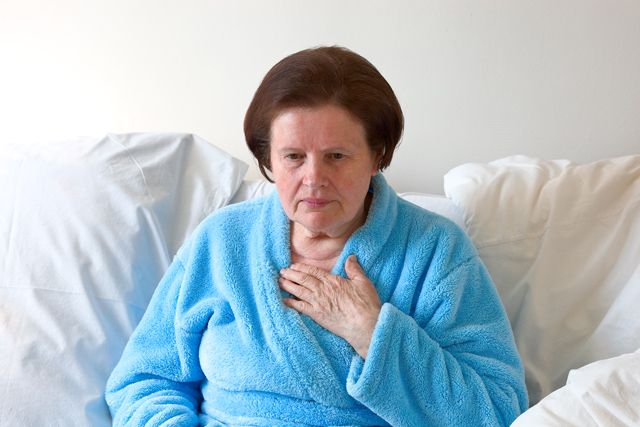A serious respiratory infection is a dreaded complication for the elderly. Here’s 5 tips to help you with this responsibility.
It seems that as the climate changes in the fall, and in many parts of the country, it’s much cooler and even wetter, we begin to hear lots about staying safe from the flu. Even when we call our pharmacy, there is a pre-loaded announcement asking if we’ve had our flu shots. But we’d like to point out there is another dangerous infection that’s even more life-threatening than the flu for our beloved senior citizens: Pneumonia!
Although pneumonia can have several origins, such as bacteria, viruses, it remains the most commonly treated infections for an older adult. The American Academy of Family Physicians has presented statistics that more than two-thirds of seniors older than 65 are admitted into hospital care because of pneumonia. Those are huge numbers!
You may wonder why pneumonia affects people over 65 with such great impact. There are several reasons; namely, a decrease in lung capacity that occurs naturally with age, an increase in exposure to disease in group environments and settings, as well as the very presence of conditions such as cardiopulmonary and diabetes which may put the patient in a predisposed position for developing pneumonia.
1. Learn and Be Aware of the Symptoms of Pneumonia in the Elderly
For a younger person, classic symptoms of pneumonia are a heavy cough, a high temperature and body chills. But your elderly loved one may not show the same signs of the illness according to the Infectious Disease Clinics of North America. Be on the lookout for symptoms that don’t necessarily line up with these classic symptoms. It could be weakness, getting confused, experiencing delirium or even simple dizziness. This is even more so in patients who suffer dementia or full-blown Alzheimer’s. These mental problems will prevent a loved one from accurately communicating or reporting typical pneumonia symptoms. As well, you’ll have to be extra vigilant to notice signs of pneumonia if your Senior has preexisting conditions, and it’s your job as a caretaker and one who loves them to stay alert and be sure to have a conversation with your medical provider at the first hint something could be leading to pneumonia. It’s that important!
2. Good Hygiene Counts!
We can’t emphasize enough how important plain old hand-washing is! Infections such as the common cold and other respiratory infections, including the flu, can lead to pneumonia. The Mayo Clinic has reported that if people will simply never fail to wash their hands or use hand sanitizer on a regular basis, this can help prevent the spread of these nasty germs that can be so devastating to the elderly. And there are other kinds of infections, like oral or dental infections, which can also lead to pneumonia, so it isn’t just washing your hands that’s a MUST – it’s good dental hygiene as well. We think it goes without saying, but to keep your elderly loved one safe, keep them away from others who are sick. It could be just a routine common cold, or it could be children with chicken pox or the measles; believe it or not, they can all lead to pneumonia.
3. Pneumonia Immunization
There is a one-time vaccine against bacterial pneumonia, and The Mayo Clinic and the National Heart, Lung and Blood Institute both have advisories out urging that you have seniors or any other “at-risk” individual vaccinated. This immunization will prevent or at least reduce the severity of having pneumonia. Sometimes physicians will suggest having a booster shot after a few years. Since the flu can lead to pneumonia, it is wise to discuss the flu vaccine with your doctor as well.
4. NO Smoking!
If the elderly people in your care smokes, do everything you can to see that they stop immediately. Being a smoker increases the risk factor associated with pneumonia greatly. It not only increases the risk of getting the disease, but it will greatly limit the ability of the lungs to heal and it lowers the entire body’s ability to fight off infection. Quitting smoking is one of the best things your Senior could possibly do to stay healthy.
5. Good Health Matters!
Habits of good overall health are of prime importance when it comes to preventing disease, including pneumonia, for the elderly and really, everyone else, too. Good nutrition will help the immune system remain strong and keep the ability to fight off infections. Physical exercise is also important in the grand scheme of good health, too. Along with adequate sleep, be sure to have your loved one exercising as much as is appropriate for his or her condition. So, that wraps it up: Eat right, sleep well, and exercise!
These tips should help prepare you to help prevent pneumonia.
For more tips to help you care for your elderly loved ones, visit our senior home care blog.
Home Helpers of Greater Cincinnati and Northern Kentucky is a locally-owned, trusted home health care agency and offers quality, compassionate senior in-home care services including home care assistance, personal care, companion care, respite care, Alzheimer's & dementia care as well as homemaker services in Cincinnati, Kenwood, Blue Ash, Indian Hill, Greenhills, Fort Thomas, Hyde Park, Madeira, Sharonville, Mason, West Chester, Mt. Lookout, Anderson, Wyoming, Covington, Burlington, Florence, Montgomery, Mt. Washington, Finneytown, Milford, Newport, Clifton, and Forest Park.

